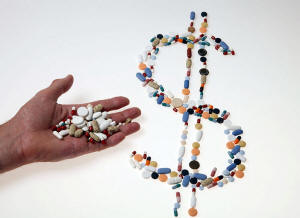Pharma companies less concerned after hearing from US on negotiated
prices for Medicare
 Send a link to a friend
Send a link to a friend
 [July 30, 2024]
By Patrick Wingrove and Michael Erman [July 30, 2024]
By Patrick Wingrove and Michael Erman
(Reuters) - Four pharmaceutical companies involved in the first U.S.
negotiations over prices for the Medicare program said they do not
expect a significant impact on their businesses after seeing
confidential suggested prices from the government for their drugs that
will take effect in 2026.
Top executives from Bristol Myers Squibb, Johnson & Johnson, AbbVie and
AstraZeneca, which have five of the 10 drugs chosen for the first wave
of negotiations, described their newly informed views on quarterly
conference calls.
The U.S. Medicare health program spends billions of dollars annually on
drugs for 66 million people ages 65 and older or who have disabilities.
It is expected to announce 2026 cuts to list prices of at least 25% by
Sept. 1.
"I think the drugmakers were frightened (these prices) would be a big
deal. But now, the ones who have reported or commented have actually
said it seems to be OK and in line with expectations," UBS analyst Trung
Huynh said in an interview.
Under President Joe Biden's Inflation Reduction Act, signed into law in
2022, the Medicare agency was required to identify the 100 most
expensive drugs in the program and pick 10 for price negotiations that
began last year.

Bristol Myers CEO Chris Boerner on Friday said the company was
increasingly confident it could navigate the IRA's impact on the
blockbuster blood thinner Eliquis it shares with Pfizer, having seen the
government price.
Still Boerner, along with AbbVie's CEO, reiterated industry concerns
that the government was "price setting" under the program and that the
practice would harm innovation.
Two analysts said they expected the government program to reduce the
list prices of these drugs by between 50% and 60% based on drugmakers'
comments.
It is common for drugmakers to provide discounts off the list price
based on sales volume, but those discounts are not public.
Several drugmakers as well as industry lobbying groups PhRMA and the
U.S. Chamber of Commerce filed lawsuits to stop the prices from going
into effect, which have largely failed.
ďAs expected, price setting has been a flawed and political process,"
said Nicole Longo, spokeswoman for PhRMA.
[to top of second column]
|

Pharmaceutical tablets and capsules are arranged in the shape of a
U.S. dollar sign on a table in this picture illustration taken in
Ljubljana August 20, 2014. Picture taken August 20. REUTERS/Srdjan
Zivulovic/File Photo
 She said the program has operated
without making clear how it incorporates feedback from patients,
providers, and manufacturers into the price, accusing it of putting
government cuts ahead of patients.
AbbVie CEO Robert Michael said last week the company has included
the expected sales hit to its blockbuster leukemia drug Imbruvica in
its forecasts.
"We've come out and said that even with modeling that impact in,
that we still expect to deliver on our long-term outlook," Michael
said.
J&J executive Jennifer Taubert said the company's long-term growth
forecast "still looks very good to us today," after seeing the
discounts suggested by the government for its top-selling psoriasis
drug Stelara and blood thinner Xarelto, which are among the first 10
chosen for negotiations.
J.P. Morgan analyst Chris Schott said in a note that comments by
Bristol and J&J suggest they received more reasonable price cuts
than initially feared.
The Centers for Medicaid and Medicare Services, which runs the
program, did not respond to a request for comment.
An AstraZeneca executive last week said the company expected a
limited impact because its diabetes drug Farxiga will face
competition from cheaper generic drugs around three months after the
new price takes effect in 2026.
At least five of the other drugs on the initial government list,
including Merck & Co's diabetes drug Januvia and Amgen's rheumatoid
arthritis treatment Enbrel, are expected to face generic competition
by 2029, according to Guggenheim Partners analyst Vamil Divan.
(Reporting by Patrick Wingrove and Michael Erman in New York;
Additional reporting by Maggie Fick in London; Editing by Caroline
Humer and Bill Berkrot)
[© 2024 Thomson Reuters. All rights reserved.]This material may not be published,
broadcast, rewritten or redistributed.
Thompson Reuters is solely responsible for this content.
 |